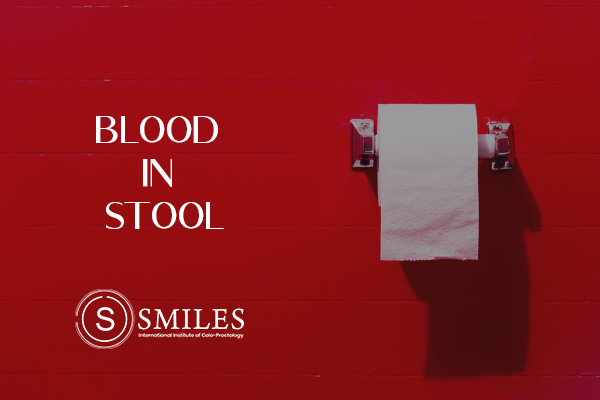Finding blood in your stool can be scary. Fortunately, most of the causes of blood in the stool or rectal bleeding are not life-threatening if evaluated and treated at the right time. While blood clots in stool can be a symptom associated with several serious medical conditions such as colon cancer, this usually is not a case.
However, SMILES, Institute of Gastroenterology explains that if you find blood in your stool, it is not normal and should not be avoided always. You should seek advice from the best coloproctologists to determine the cause of bloody stool and treatment options.
What are the causes of Blood in stool?
Bloody stool or Blood clots in stool is a sign that there is bleeding somewhere along the digestive tract. The rectal bleeding or hematochezia can range in color from bright red to maroon, and it may appear black and tarry if the bleeding occurring higher up in the digestive tract.
D. Parameshwara C M, the best colorectal surgeon at SMILES outlined some of the possible blood in stool causes include:
- ● Hemorrhoids: Piles or Hemorrhoids are swollen blood vessels found in the anus or rectum that can be itchy, painful and sometimes bleed. Those who suffer from hemorrhoids may often notice painful bowel movements and blood in the stools.
- ● Anal Fissures: An anal fissure is a small tear in the lining of the anus, which can cause bleeding and burning sensation after a bowel movement.
- ● Crohn’s disease: Crohn’s disease causes inflammation of the digestive tract lining and can lead to bleeding from the colon, severe diarrhea, and abdominal pain.
- ● Colon Polyps: Polyps are benign growths that form along the lining of the colon. Although usually harmless, colon polyps can grow, bleed and become cancerous gradually.
- ● Colon cancer: Bloody stools can also be a symptom of cancer along the digestive tract. Colon cancer and anal cancer are the two types of cancers that can cause bleeding.
- ● Peptic ulcers: Peptic ulcer is open sore that bleeds in the lining of the stomach, the upper end of the small intestine or duodenum caused by a bacterial infection.
- ● Diverticulosis: Diverticulosis is a condition in which small, bulging pouches develop in the digestive tract. Usually, diverticulosis is harmless, but they can bleed and become infected.
When to seek medical attention for rectal bleeding?
Dr. Parameshwara C M, a top coloproctologist in Bangalore suggests that immediate medical attention is required when rectal bleeding is present with one or more of the following symptoms.
- ● Abdominal pain
- ● Nausea or vomiting
- ● Bleeding continues or worsens
- ● Altered bowel habits
- ● Severe diarrhea
- ● Unintentional weight loss
- ● Involuntary seepage of stools or inability to have bowel movements
- ● Large volume blood loss
- ● Rectal pain
- ● Dizziness, fainting, and weakness
- ● Difficulty breathing
- ● Rapid heartbeat
What is the medical treatment for rectal bleeding?
Your doctor may use several techniques to stop acute blood in the stool. Beyond stopping the immediate bleeding, treatment for rectal bleeding involves addressing the source and cause of the bleeding to keep it away from returning.
Often endoscopy is used to inject medicine into the location of the bleeding and treat using a laser to stop the bleeding. If endoscopy does not control bleeding, your doctor may use angiography to inject medicine into the blood vessels to control bleeding.
Treatment for rectal bleeding varies depending on the cause and may include medications such as antibiotics or anti-inflammatory drugs. Sometimes, Sigmoidoscopy may be needed to remove polyps of the colon damaged by cancer or inflammatory bowel disease.
What are the home remedies for blood in stool?
According to our qualified gastroenterologists and colorectal surgeons at SMILES, the minimal rectal bleeding or spotting due to constipation or hemorrhoids can be treated on your own.
Simple home remedies of rectal bleeding include:
- ● Drink not less than 8 to 10 glasses of water per day
- ● Cleanse the skin around the anus regularly
- ● Do not strain during the bowel movements
- ● Avoid sitting too long on the toilet
- ● Increase fiber in the diet
- ● Apply ice packs to the affected area to reduce the discomfort
- ● Take a sitz bath or warm water bath to relieve the itching and pain
If you do experience moderate to severe rectal bleeding consult our best gastroenterologists in Bangalore at SMILES, Institute of Gastroenterology to achieve the best outcome.

